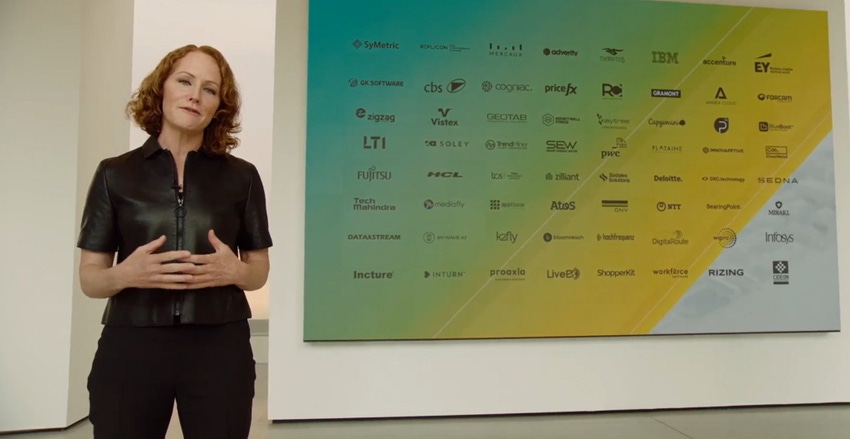SAP Business Network Aims to Integrate Fragmented Supply Chains
Combining the Ariba marketplace, logistics and asset networks into a unified procurement net is an ambitious plan.

SAP SAPPHIRE NOW — SAP has an ambitious plan to integrate its disparate supply chain networks with the launch of SAP Business Network. The initiative, revealed Wednesday at SAP’s Sapphire NOW conference, combines SAP’s logistics and asset networks, along with its Ariba marketplace.
The SAP Business Network promises to provide greater visibility and management within supply chains that have long been fragmented. The integration of Ariba, SAP Logistics Business and SAP Asset Intelligence will provide unified business processes across buyers and suppliers. Collectively, SAP claims it will bring together 5.5 million enterprises into a common trading network.
CEO Christian Klein introduced the SAP Business Network during the opening keynote session of Sapphire NOW. Running as a digital event throughout mid-June, expect details on deliverables to emerge during subsequent Sapphire NOW sessions.

SAP CEO Christian Klein presenting at SAP SAPPHIRE NOW 2021
“We believe that industries will be revolutionized when businesses turn into communities,” Klein said. “We want to connect every company across your entire supply chain, and in doing so, provide you with immense value from being a member of this community. Buyers, multitier suppliers, logistic providers, manufacturers and banks will be able to respond to any disruptions real time through their connections in the network.”
Klein acknowledged that the SAP Business Network is a “bold vision.” But he emphasized SAP’s formidable role as a supplier of ERP solutions and its sizable customer base.
“And because our applications run supply chains across every industry, we have the most relevant data and expertise,” he said.
Challenges Ahead
While delivering on the vision of the SAP Business Network is a major undertaking, SAP also faces many challenges.

EA Consult’s Joshua Greenbaum
“There are many moving parts and there’s a lot of work to be done,” said industry analyst and ERP consultant Joshua Greenbaum of EA Consult. Once SAP integrates the siloed networks, onboarding will be a major task as well, according to Greenbaum.
“How do you onboard that critical mass of suppliers and partners to make it worthwhile,” Greenbaum queried. “The Ariba Network is a good starting point, but it is not in any way a done deal.”
Nevertheless, Greenbaum believes the company is strongly positioned to deliver on the promise of the SAP Business Network.
“This is SAP’s opportunity to lose,” Greenbaum said. “They are in the best position, in my view, of any of the enterprise software vendors to actually do this. They need this win badly and they should get it. If they don’t, it’s shame on them for failing.”
Noting its complexity, SAP said it will onboard – free of charge – customers’ 100 most strategic suppliers onto the SAP Business Network within 90 days of going live.
“That in itself says something, because they’re offering that incentive,” Greenbaum said.
Fragmented Supply Chains Exposed by COVID-19
At the onset of the pandemic last year, the disjointed state of many supply chains was in the spotlight. SAP’s ERP offerings and business applications are among the heart of many companies that buy and sell goods. The issue of fragmented supply chains is …
… nothing new, but the need to address it has escalated, said Julia White (pictured above), SAP’s chief marketing and solutions officer, and a member of the company’s executive board.
White, the former Microsoft corporate VP who joined SAP in January, led the keynote with Klein. White also appeared in a subsequent media and analyst Q&A session.
“Obviously, SAP has been in the business network category for a while, but the past 18 months has brought this absolutely to the forefront of the need,” White said. “With COVID, we saw that it is overdue to really rethink how we’re engaging together. I think you saw a great first step of us converging our different emphasis networks into a singular experience. Now, there’s one portal you can see across everything, and also bring so much more value to the members.”
Rise with SAP
Building on the SAP Business Network, the company also revealed new capabilities to automate business processes. The company is expanding its Rise with SAP, which it launched earlier this year for SAP S/4 HANA Cloud, with more modules. SAP is adding procurement and an HR module, along with Rise with SAP for Industries.
Rise With SAP is for organizations that want to transform their business processes and implement new analytics and best practices. The first five industry solutions will be available for automotive, retail, consumer products, industrial machinery and components (IM&C) and utilities. SAP said it will elaborate on those solutions next week.
White said SAP’s partners have embraced the new solutions, particularly services partners and ISVs.
“We’re seeing all of them excited about the opportunity that this is unfolding,” she said. “I think it’s getting to real business process transformation, not just a migration project, which is what services partners are great at. On the other side is applications, the ISVs and the ecosystem of building extensions for our cloud solutions.”
Want to contact the author directly about this story? Have ideas for a follow-up article? Email Jeffrey Schwartz or connect with him on LinkedIn. |
About the Author(s)
You May Also Like


